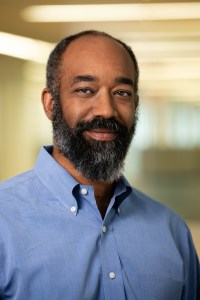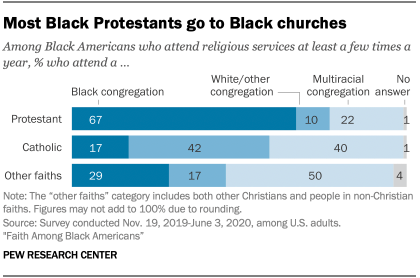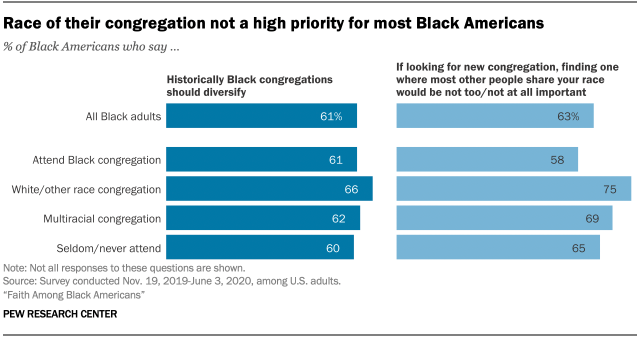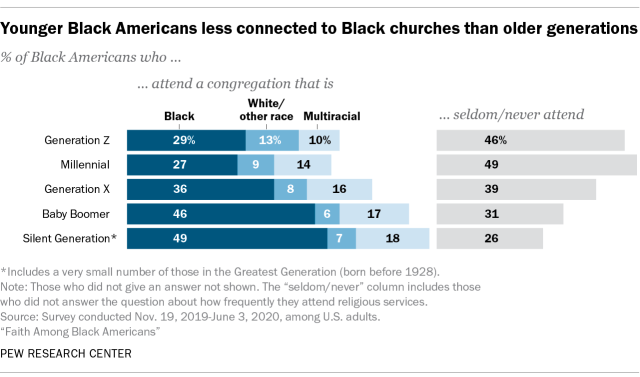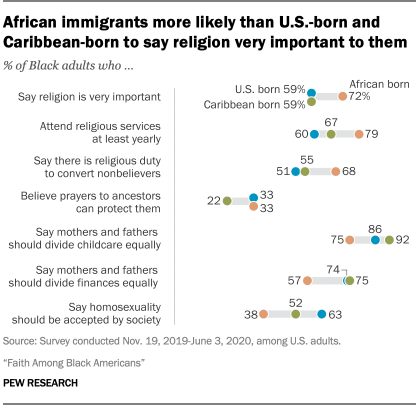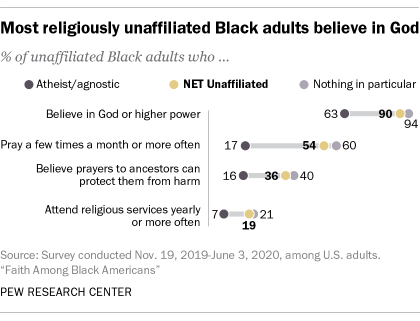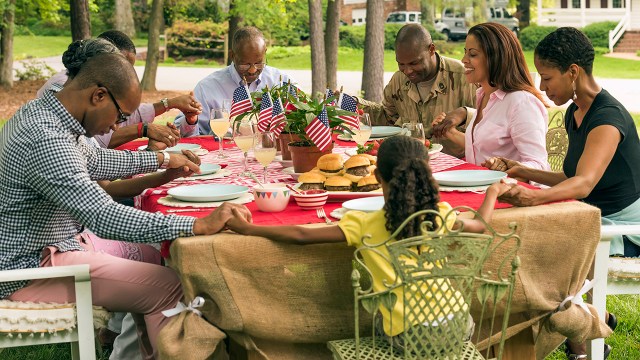
Black American religious life is diverse, encompassing a wide range of religious affiliations, worship practices and beliefs. While previous research has highlighted the ways in which the faith of Black adults differs from that of other U.S. racial groups, a new Pew Research Center report takes a closer look at the religious diversity among Black Americans.
Based on a survey of 8,660 Black and African American adults – including some who identify as both Black and Hispanic or Black and another race – the report examines the high levels of religious commitment among Black Americans and the large share who are Protestants. The report also explores new questions, including the role of churches, views on gender and belief in God.
Here are 10 key findings from the survey, which was conducted Nov. 19, 2019, through June 3, 2020.
Pew Research Center conducted this study to explore the breadth and diversity of Black Americans’ religious experiences. This survey represents Pew Research Center’s most comprehensive, in-depth study of the subject, drawing on a nationally representative sample of 8,660 Black adults (ages 18 and older). The sample consists of a wide range of adults who identify as Black or African American, including some who identify as both Black and Hispanic or Black and another race (such as Black and White, or Black and Asian).
Survey respondents were recruited from four nationally representative sources: Pew Research Center’s American Trends Panel (conducted online), NORC’s AmeriSpeak panel (conducted online or by phone), Ipsos’ KnowledgePanel (conducted online) and a national cross-sectional survey by Pew Research Center (conducted online and by mail). Responses were collected from Nov. 19, 2019, to June 3, 2020, but most respondents completed the survey between Jan. 21 and Feb. 10, 2020.
Here are the questions used for this report, along with responses, and its methodology.
Throughout this post, Black churches and congregations are defined as those where the respondent said that all or most attendees are Black and the senior religious leaders are Black. White or other race churches and congregations are those where the respondent said that either most attendees are White; most attendees are Asian; most attendees are Hispanic; or most attendees are of a different (non-Black) race, and the same is true of the senior religious leaders. Multiracial churches and congregations are primarily those where the respondent said that no single race comprises a majority of attendees – regardless of the race of the religious leaders. This category also includes smaller numbers of congregations where the majority of the congregation is not Black, but senior religious leaders are Black; congregations where all or most attendees are Black but the senior religious leaders are not; and congregations where the senior religious leadership is multiracial – regardless of the race of the congregation.
Black Protestants are far more likely than Black Catholics to attend a Black church. Overall, six-in-ten Black Americans who attend religious services go to a Black congregation, but there are differences by tradition. Two-thirds of Black Protestants who attend religious services at least a few times a year go to a church where most of the congregation and leaders are Black, while only 17% of Mass-going Black Catholics worship at a Black church. Among Black adults of other faiths – including those who identify with Christian and non-Christian faiths – 29% attend Black places of worship.
Most Black Americans value racial diversity in religious spaces. Six-in-ten Black Americans say historically Black congregations should become more racially and ethnically diverse (61%), almost twice the share (33%) of those who say these congregations should preserve their traditional racial character. And if they were looking for a new congregation, 63% of Black adults say finding one where the attendees share their race or ethnicity would be “not too important” or “not at all important,” while 34% say it would be “very important” or “somewhat important.” Most Black adults who go to Black congregations hold these views, as do a majority of those who go to a congregation largely made up of White Americans or people of another race.
Congregations attended by Black Americans vary in their worship style. Expressive forms of worship, such as calling out “amen” or other expressions of approval by the congregation – known as call and response – are almost always reported by Black adults who go to Black Protestant churches but less commonly reported by Black Protestants who attend churches where most congregants and leaders are White or of another race (99% vs. 81%). Spontaneous dancing, jumping or shouting are also parts of religious services more often experienced by attenders of Black Protestant churches (76%) than by those who attend Protestant churches where the congregation and leadership are mostly some other race (37%). Black Catholics are even less likely to say they see call and response (66%) or spontaneous dancing, jumping or shouting (24%) in their congregations.
Black Americans who attend Black Protestant churches are more likely than others to say they have heard sermons on politics and race. According to the survey, 47% of Black churchgoers who attend Black Protestant churches heard sermons that address topics such as race relations and racial inequality in the prior 12 months, and a similar share say they heard sermons on voting, protesting or other forms of political engagement. (Given the survey’s timing, these sermons were largely heard in 2019, before the start of the coronavirus pandemic and the 2020 racial justice protests.) By comparison, 35% of Black Protestants who attend White Protestant churches or churches where some other race is the majority say they heard sermons on race relations, and 26% said they heard sermons on political engagement. Black Catholics, meanwhile, were about as likely as Black Protestants to have heard sermons on race relations (41%), and less likely to have heard them on political engagement (31%), but they were far more likely to have heard sermons on abortion – 35% of Black Catholics heard sermons on abortion in the year prior, versus 19% of Black adults who attend Black Protestant churches.
Young Black Americans are less likely than their elders to attend a Black congregation. Three-in-ten adults in Generation Z (ages 18 to 23 when they took the survey) and a similar share of Millennials (ages 24 to 39) attend religious services at a Black congregation. This compares with almost half of Baby Boomers (ages 56 to 74) and half of Black adults in the Silent Generation and older (born before 1946). This generational gap is driven both by the fact that younger Black adults are less likely to attend religious services regularly and that those who do attend are more likely to go to a congregation where the majority is White or another race.
Opposing racism is an essential religious issue for most Black believers. Among Protestants, 75% of those surveyed say opposing racism is essential to being Christian, as do 77% of Catholics. In addition, about eight-in-ten Black adults who identify with other Christian or non-Christian faiths say opposing racism is essential to their own religious identity. Of those who do not describe opposing racism as “essential,” most say it is “important.” Taken as a whole, religiously affiliated Black Americans are somewhat more likely to say belief in God is essential to their religious identity (84%) than to say this about attending religious services (39%), avoiding sex before marriage (30%), or opposing abortion (23%). Similar shares of religiously unaffiliated Black Americans (71%) say opposing racism is essential to their definition of what being a moral person means to them.
When it comes to gender roles, Black adults typically express egalitarian views, but many Black congregations emphasize men’s experiences and leadership more than women’s. About seven-in-ten Black Americans say opposing sexism and discrimination against women is essential to being a faithful or moral person, nearly the same as the share who say opposing racism is essential. However, Black Americans who attend religious services at least a few times a year are much less likely to have heard sermons on sexism (28%) than on racism (42%). And although the majority of Black Americans believe that mothers and fathers who live in the same household should share parenting (86%) and financial responsibilities (73%) equally, those who attend religious services are more likely to say their congregations emphasize men’s financial role in the family (64%) more than women’s (35%). Likewise, about six-in-ten Black congregants say their houses of worship emphasize the need for men to be role models in Black communities, while about half say theirs emphasize this for women.
Black Americans who were born in the U.S. are less religiously engaged and less socially conservative than immigrants from Africa. Almost eight-in-ten Black Americans who were born in sub-Saharan Africa attend religious services at least yearly, compared with six-in-ten U.S.-born Black Americans who do so. African immigrants also are more likely to read scripture outside of services several times a week (50% vs. 38%) and to say religion is very important in their lives (72% vs. 59%). On social issues, the share of people who say that homosexuality should be accepted by society is 63% among U.S.-born Black Americans, but only 38% among African immigrants. When it comes to family roles, African immigrants are less likely than U.S.-born Black Americans to say that parents in a household with both a mother and father should divide finances evenly (57% of African immigrants vs. 74% of U.S. born Black Americans).
Most Black Americans pray regularly, and prayer plays a variety of roles in their lives. Eight-in-ten Black Americans pray at least a few times a month, including 63% who pray daily. Black Americans are much more likely to say they rely “a lot” on prayer and religious reflection (56%) than on advice from religious leaders (18%) when making major life decisions. In fact, Black Protestants are about as likely to rely on prayer when making major decisions (72%) as to rely on their own research (67%). In addition, about three-quarters of Black Americans (78%) say that prayer can heal physical illness. And a third of Black Americans say that prayers to ancestors can protect them.
Unaffiliated Black Americans often are religiously engaged. While 21% of Black Americans say they are religiously unaffiliated, only 3% identify as atheist or agnostic, while 18% describe their religion as “nothing in particular.” Many of those who say they are “nothing in particular” are religious on a number of measures. For example, 94% of Black adults in that category say they believe in God or a higher power, and 60% say they pray at least a few times a month. Furthermore, adults who say they are “nothing in particular” (40%) are more likely than Black Protestants (30%) and atheists or agnostics (16%) to believe that prayers to ancestors can protect them from harm.
Note: Here are the questions used for this report, along with responses, and its methodology.
